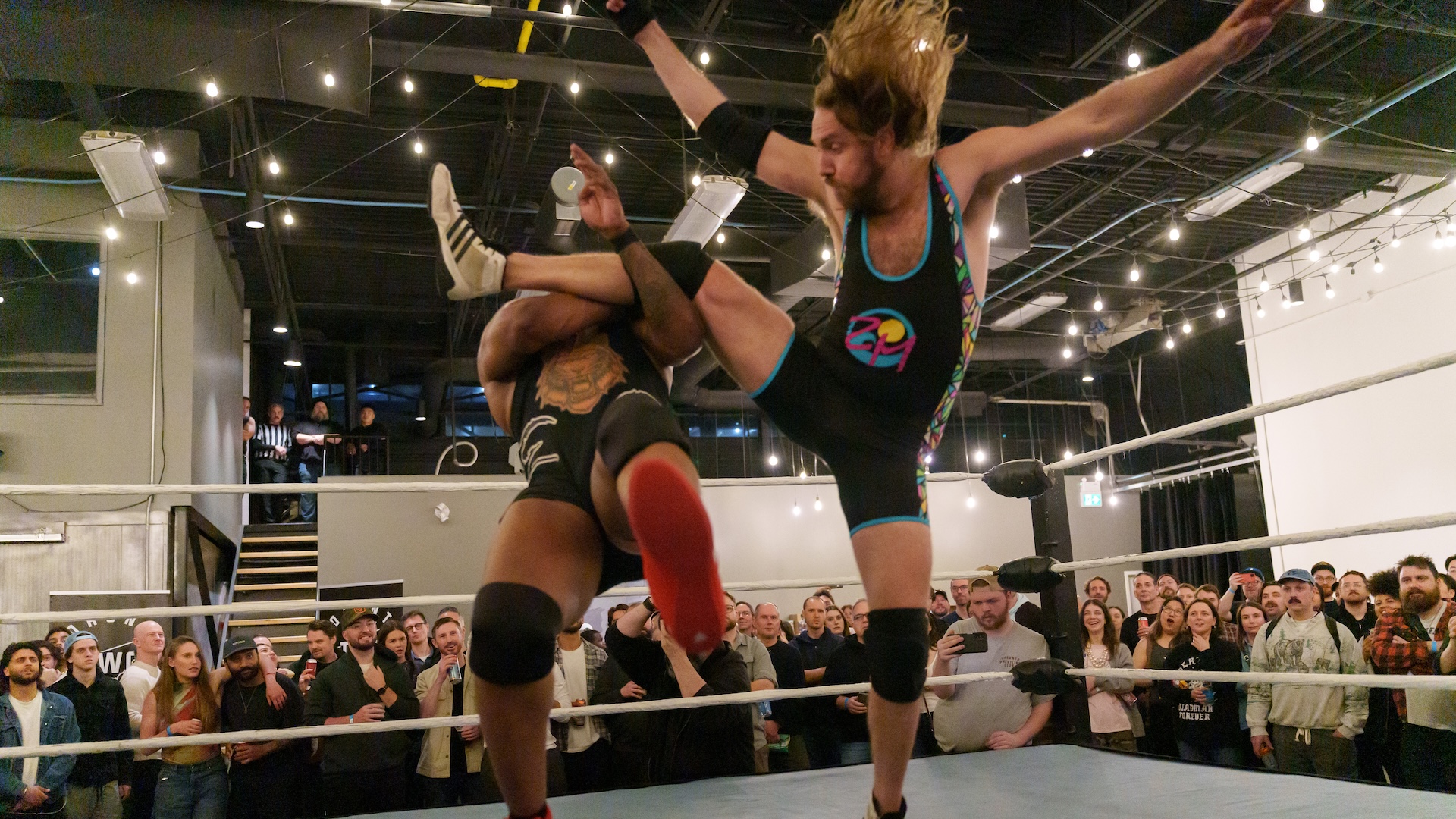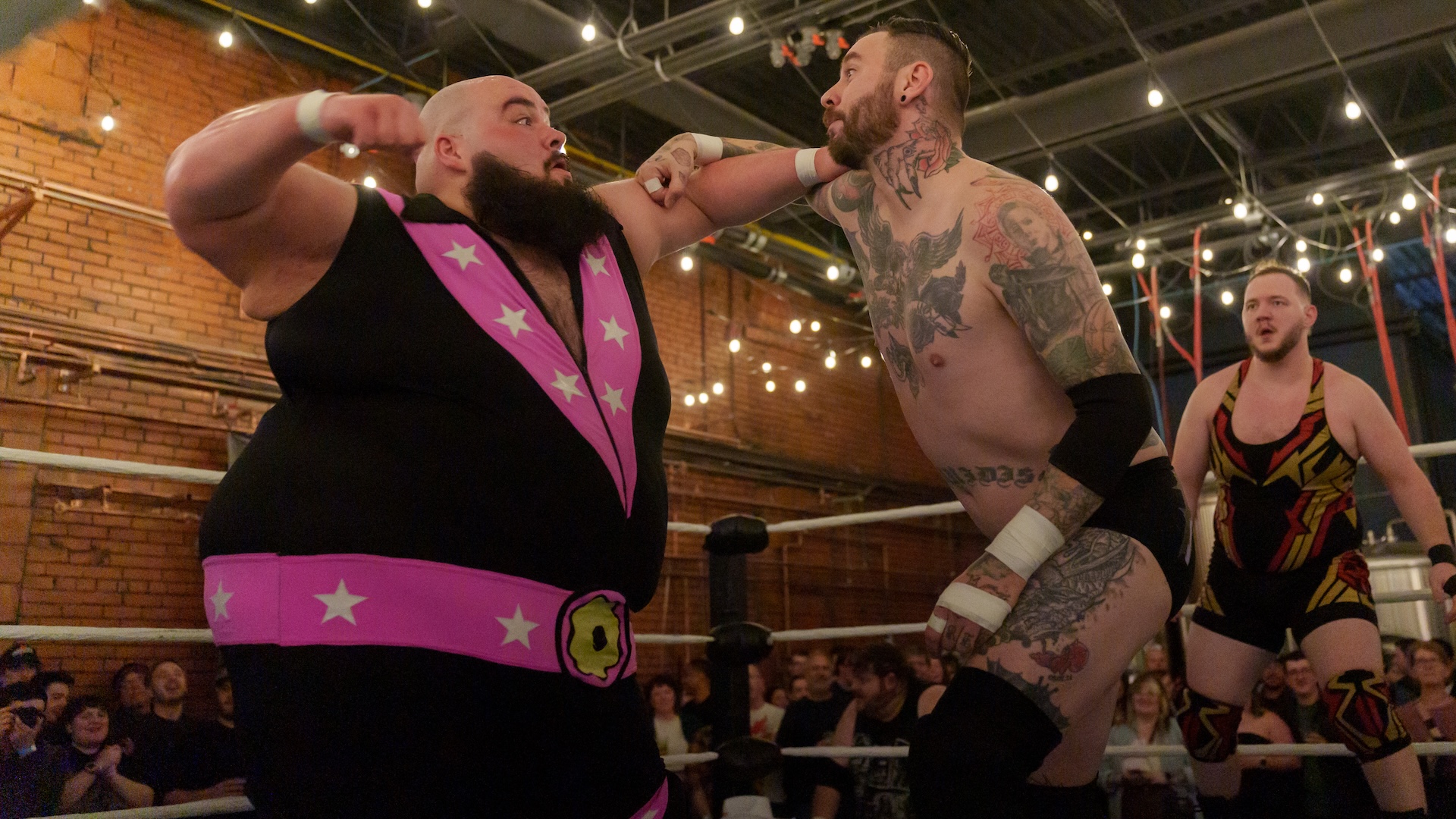To get to Henderson Brewing Company from Dundas on foot, you need to pass the Nestlé Factory on Sterling Road. The smell of chocolate perfumes the air. Henderson is a stone’s throw from the quaint and family-friendly Roncesvalles Avenue, but slapped in the middle of an industrial park and bordered by train tracks on one side, the surrounding area’s winsome charm is the last thing you’re thinking of as you emerge into the parking lot Henderson shares with one of the Terroni innovation kitchens. On most weekend evenings, all you can hear standing outside is the din of conversation, maybe some raucous laughter. But a few times a year, you’re met with the foreign, thunderous sound of a body hitting the mat of a wrestling ring, hard. The crowd inside — you won’t know until you step inside, but there is a crowd and it’s big — erupts with cheers. Inside, a Toronto Wrestling Club show is underway, and it’s your lucky night.
Founded by Kyle Sikorski, Mike Juneau and Stratos Aslandis, Toronto Wrestling Club (TWC) has cemented itself as the preeminent wrestling promotion in the city. The shows are rife with raucous fun, the crowd slowly getting a little tipsy as wrestlers battle it out in the ring. The club’s goal: to have a hyper-local show to bring wrestling to a new audience while giving emerging talent a sustainable platform through which to perform.
“I like to think that a reason why our show connects with people is that our wrestlers also look like people in the audience. We don’t have big, monstered, muscle-bound people,” Juneau says. “So I think seeing guys and thinking, ‘Hey, that looks like my neighbour,’ or ‘That could be my brother,’ makes you connect to the person in the ring more than thinking like, ‘Wow, that guys looks like a monster.’”
Sikorski, Juneau and Aslandis all wrestle as well as produce each TWC show. Previously, Sikorski had wrestled in Orangeville for another promotion (wrestling-speak for the companies that organize these events). There are various promotions in the GTA; one is geared towards child audiences, there’s another that treats each event more like a party, another that specifies in lucha libre — but none local enough that satisfied Sikorski and his co-founders. “We like to have our friends and family come see us wrestle,” Sikorski says. “They’re not going to come to Orangeville to see me wrestle.”
Sikorski, Juneau and Aslanidis met in their late twenties and early thirties when they joined the same wrestling company to try out a new form of physical activity. Both Sikorski and Juneau were obsessed with wrestling as children, so “it was a lifetime of watching and learning,” Juneau says.
Like most niche hobbies that require specific equipment, wrestling is expensive. “Anyone who has space and a ring is charging a premium,” Juneau says. Having wrestled ad-hoc in various promotions in southern Ontario, striking off on their own was an easy decision.
Though their initial test shows were held at Elsie’s in the Junction, TWC has found a more permanent home at Henderson, a decision rife with coincidences. Henderson had just cleared half the brewery to make space for events and its owner — a wrestling fan in his own right — was looking for a wrestling show to host, so he reached out to TWC. One of the first Elsie’s shows was called the Whipper Watson Wrestling Classic, named after Toronto wrestling legend “Whipper” Billy Watson. In 2022, Henderson brewed a beer in honour of Watson, which they brought back on the occasion of TWC’s first show at the brewery. Since then, they’ve hosted TWC’s shows, including their upcoming Fantasy Fight Night in celebration of Halloween on Oct. 24.
At first, their biggest worry was not selling enough tickets. The production is costly, given the rented ring and the hired security, but after they had a few shows under their belts, patterns began to emerge. Most tickets sell in the days leading up to the event, and they’ve never had an issue with attendance, though they still won’t know what demographics will be showing up until doors open. Rather than a challenge, the trio sees this as a welcome opportunity. Knowing they would have a diverse audience at their Pride & Glory show in June, they leaned into the theme. One wrestler, Puf, brought his own pride flag that they worked into his matchup and Chappell Roan’s “Pink Pony Club” played later as another wrestler’s walkup song.
It is decisions like these that differentiate Toronto Wrestling Clubs from other promotions, in that they try to create a positive environment for both promoters and their spectators alike.
“We take pride in paying every single person on the show a more than fair amount than other wrestling shows. It’s an outdated carney practice of people working for free,” Sikorski says (it’s common practice for wrestlers to perform only for exposure with other promotions).
Most performers have to take a day off work on the day of the show, which will typically last until 11 p.m. Sikorski, Juneau and Aslanidis all have other employment on top of the work they do for TWC.
“There’s no way we probably could put on a show without having stable [income],” Sikorski says.
“There’s no way we could have even trained,” Juneau adds. Though the trio are paid as performers as well as organizers, the money they earn goes right back into putting on the next show. “None of us started this with the intention to make the money. We started it with the intention of having a wrestling show that we love in the city and that respects the audience.”
Unlike other promotions, TWC makes a concerted effort to start and run on time. It also breaks convention by having a wrestling agent by the name of John Green run interference between matchups so that there’s no repetition of moves, ensuring that everyone has their special moment as designed.

There’s very little choreography that’s passed on from organizers to wrestlers. Sikorski, Juneau and Aslanidis will give light storylines or beats that wrestlers have to hit, but otherwise the bulk of what happens in the ring is decided by the performers themselves.
As shows have become more intricate, TWC has introduced short video playback of highlights or key moments prior to a matchup to get the audience up to speed and better understand the characters.
“I always try to compare it to jazz,” Juneau explains. “Jazz is improvised, but they have a structure or a type of song, and before the song they’re like, ‘Let’s do B minor and take the bassline for a walk.’ That’s kind of the equivalent of a wrestling chat. ‘OK, you’re going to go over the neck and I’m going to be tough in the heat.’”


